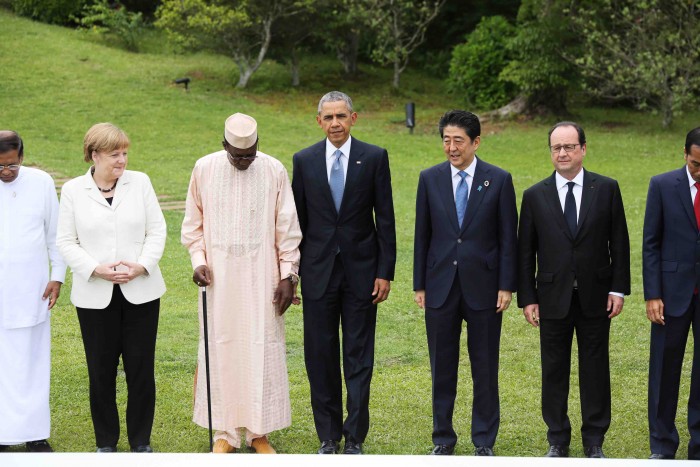Media Report

- The Washington Post reports: "The leaders of the Group of Seven countries expressed concern Friday over China's increasingly assertive activity in the East and South China seas, renewing their warnings against one-sided attempts to change the situation, and stressed the importance of peaceful resolutions. In a declaration wrapping up their annual summit, the G-7 leaders called for regional and international cooperation on preserving freedom of navigation in the regional seas and cooperating to use the ocean in a sustainable way....The construction of islands on land reclaimed in the South China Sea was not formally on the G-7 agenda during its meetings in this seaside resort on Japan's Pacific Coast. But officials indicated it was a concern. U.N. Secretary of General Ban Ki-moon, who was attending talks on the sidelines of the summit, urged that China and ASEAN member nations reach agreement soon on a 'Code of Conduct' to avoid further escalation of disputes in the region."
- Reuters reports: "As U.S. President Barack Obama marked one of his last trips to Asia by the historic lifting of Washington's arms embargo on Vietnam, he repeatedly insisted it was not directed at Beijing. And yet regional military sources and security analysts say China will face short and longer term strategic headaches from the fully normalized relationship between former enemies in Hanoi and Washington. Operationally, China faces the short-term prospect of Vietnam obtaining U.S.-sourced radars and sensors, surveillance planes and drones to better monitor and target Chinese forces, the analysts say. In the longer term, the move makes Hanoi a key player in Obama's strategic pivot to East Asia....Chinese official reaction has so far been muted."
- Reuters reports: "U.S. regulators launched an investigation on Thursday into complaints by United States Steel Corp that Chinese competitors stole its secrets and fixed prices, in the latest trade spat between the two countries. U.S. Steel is seeking to halt nearly all imports from China's largest steel producers and trading houses, in its complaint made under section 337 of the main U.S. tariff law....U.S. Steel Chairman Mario Longhi applauded the [International Trade Commission's] decision to investigate claims which include that Chinese producers falsely named other countries as the origin of their products and illegally transhipped them through third countries to avoid anti-dumping and anti-subsidy duties. 'We remain confident that the evidence will prove the Chinese steel producers engaged in collusion, theft and fraud and we will aggressively seek to stop those responsible for these illegal trade actions,' Longhi said in a statement."
Calendar
- 2016-05-26 China warns G7 not to ‘escalate tensions’ in Asia
- 2016-05-25 On the Agenda But Off Guest List, China Eyes G-7 in Japan
- 2016-05-24 Don’t start a fire in Asia, China warns Obama after Vietnam arms embargo lifted
- 2016-05-23 China plans base station for rescue operations in South China Sea
- 2016-05-22 US wields biggest stick in trade dumping fight
- 2016-05-20 Taiwan President Takes Cautious Line on China at Inauguration
- 2016-05-19 China, Denying Close Encounter With American Plane, Points Finger at U.S.
- 2016-05-18 China criticizes US steel anti-dumping measures
- 2016-05-17 Top ranked Chinese official to 'listen' to HK demands as independence calls grow
- 2016-05-16 China Housing Revival Buffers Economy
News
- The Washington Post G-7 leaders express concern over South China Sea, urge peace
- Reuters China faces headaches from warming Vietnam-U.S. ties
- Reuters U.S. panel launches trade secret theft probe into China steel
- The New York Times Chinese Detergent Ad Draws Charges of Racism
- The Wall Street Journal Qualcomm Will Make China-Customized Chips Through Chinese Venture
- BBC News What's behind China's 'racist' whitewashing advert?
- Bloomberg Business G-7 Warning on South China Sea Tensions Draw China Ire
- The Wall Street Journal China Swaps Troupes for Troops
- Reuters U.S. panel launches trade secret theft probe into China steel
- The Washington Post Chinese kids who climb cliffside ladder home will get stairs
- The New York Times US Investigating Chinese Steelmakers in Trade Secrets Case
- The Wall Street Journal China's Zoomlion Abandons Pursuit of U.S. Crane Maker Terex
- Reuters After sea spat, China pledges deeper defense ties with Indonesia
- The Guardian World's scariest school run? Chinese children tackle 800-metre cliff
Commentary
- The Financial Times China has played role in raising maritime tensions
- The New York Times: Sinosphere Bus Project Finds a Way Around China's Traffic Jams: Gliding Above Them
- The Wall Street Journal: China Real Time Video: China's 'Air Bus' Rides Above the Traffic
- The National Interest America's Doomed China Strategy
- The Diplomat China Needs Market Reforms Now
- Foreign Policy A New-Old Plan to Save the World … That Has No Hope of Saving the World
- The National Interest This Is Why Americans Should Fear China's Ballistic Missile Submarines
